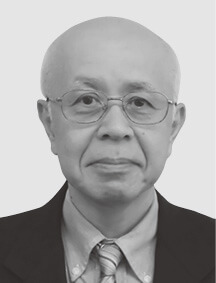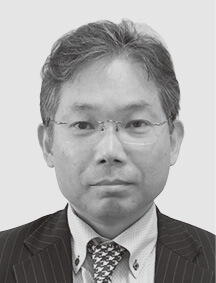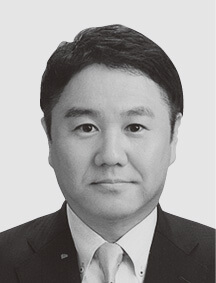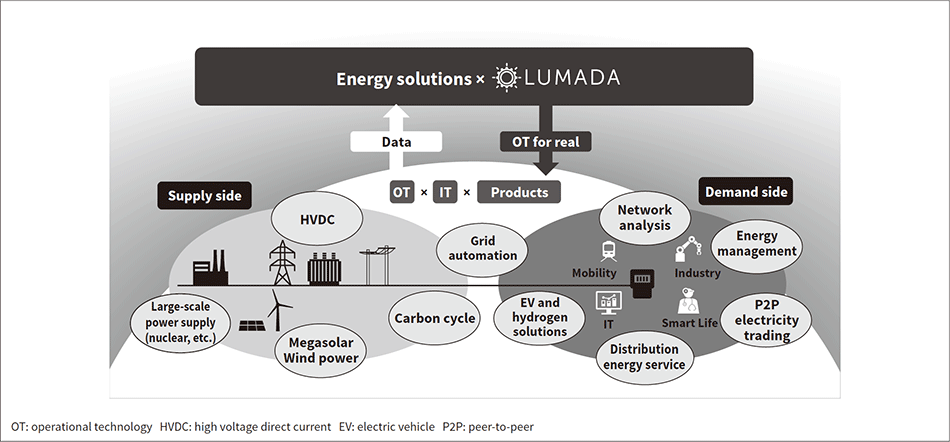Overview
Active steps are being taken to move toward a decarbonized society against the backdrop of an increasing incidence of abnormal weather events caused by global warming. Energy markets, meanwhile, are undergoing a major paradigm shift on both the supply and demand sides as a result of new developments brought about by deregulation and digital technology. It is in this environment that Hitachi’s energy business is undergoing a rebirth as a new entity that recognizes increasing diversity of needs and supplies energy solutions through collaborative creation with customers.
The following articles highlight the three areas of power grids, distributed energy solutions, and energy management, describing Hitachi’s technologies and solutions that are helping achieve a decarbonized society.



Fig. 1—Overview of Hitachi’s Energy Solutions Business for Achieving Energy Efficiency and a Decarbonized Society The business provides new values by using collaborative creation with various users and partners to rapidly deploy the expertise and know-how accumulated from the energy field and many other areas since its founding.
The business provides new values by using collaborative creation with various users and partners to rapidly deploy the expertise and know-how accumulated from the energy field and many other areas since its founding.
To realize a sustainable society, the world’s energy markets are entering a period of major change driven by the three Ds of decarbonization, decentralization, and digitalization. For the wider adoption of renewable energy sourced from natural energy as the main power source, it is necessary to cope with harsh natural environments. Another important consideration is how to provide robust transmission and distribution networks that can efficiently and reliably deliver the generated power to homes and companies. Meanwhile, advanced digital technologies are being deployed to enhance the maintenance and management of power systems, and progress is being made on using distributed power sources for the local production and local consumption of energy with the aim of creating a resource-efficient society and making good use of the resources that takes advantage of regional characteristics. This transformation is impacting upon many different sectors, bringing widespread innovation, not only in technology but also in business models, processes, and energy systems. At the same time as the emergence of new demand is bringing in a steady stream of new participants from different industries along with the involvement of power generation companies in the service business, new services are emerging that never existed before and this is being accompanied by an intensification of competition. Meanwhile, systems for energy efficiency and the optimization of consumption are in rising demand due to factors such as larger data centers, the electrification of industry, and rising numbers of electric vehicles (EVs).
While this is going on, Hitachi’s energy business has been undergoing a structural transformation from a product-based business model to a market-driven solutions business with the aim of becoming a global leader that brings social innovation into the energy field. As part of this transition, Hitachi changed the name of the business unit in charge of energy business from the Power Business Unit to the Energy Business Unit in April 2019 to make a new start that was billed as an organizational rebirth. By combining digital technologies such as Lumada with the expertise and know-how accumulated since its founding, Hitachi intends to engage in collaborative creation with various customers that support the energy value chain in order to contribute to the reliable supply of energy in ways that are safe, secure, and friendly to the environment while also using digital technology to deliver new added value that will contribute to decarbonization (see Figure 1).
Amid the ongoing transformation of the energy value chain, a change is taking place in energy markets as they move away from price competition, initially towards the intermediate step of service competition in which companies differentiate themselves by adding value to products and services, and ultimately to competing on innovation where new added value is delivered by combining distributed energy resources with the use of data, artificial intelligence (AI), and other digital technologies. The challenge for energy consumers, meanwhile, is how to use energy efficiently with a higher proportion obtained from renewable sources as they work toward the goal of decarbonization that forms part of action on the Sustainable Development Goals (SDGs).
Hitachi is seeking to transform itself into a business that delivers energy solutions through market-inspired collaborative creation in recognition of the increasing diversity of needs. In Japan, where it is difficult to control demand and establish an efficient relationship between supply and demand, there is rising demand for solutions to the management challenge posed by rising energy costs as a lack of human and financial resources prevents the upgrading of energy infrastructure. In one example involving a collaborative creation project with a supermarket chain based in the Kanto region, Hitachi is supplying a solution that improves business efficiency by overcoming the management issues associated with energy. The solution covers the outsourcing of both energy and facilities management and provides one-stop support that extends from planning new installations and the upgrading of aging equipment through to operations.
Overseas, Hitachi is participating in a demonstration project aimed at the wider use of EVs in the UK, a nation that has set a target of reducing carbon emissions by 80% of 1990 levels by 2050. Achieving this goal will require that EVs make up 60% of new vehicles in the UK by 2030. The project aims to increase EV numbers and make good use of the existing electricity distribution network while also keeping electricity prices down. It is taking place in London as a collaboration between eight companies, including local distribution operators, commercial vehicle businesses, postal services, and ride share operators, with Hitachi Vantara Limited playing a central role.
Through collaborative creation projects like this, Hitachi intends to expand its businesses that seek to overcome the management issues associated with energy.
Amid the transition from a predominance of centralized power supply into a new era of decentralized power supply, there is a push toward the use of advanced energy management techniques that utilize the Internet of Things (IoT) to bundle these distributed power sources together and balance the supply and demand for electric power by remote, integrated control. The creation of a resource-efficient society in which renewable energy as a major source of electric power will also have an important role to play in the context of energy policies that aim to increase energy self-sufficiency. Hitachi has already been working on the development of distributed generation systems that use the IoT, including a smart grid demonstration project on the island of Maui in Hawaii, USA that is led by the New Energy and Industrial Technology Development Organization (NEDO). Hitachi has also, in recent years, been part of a partnership working on a smart islands program on the Isles of Scilly, located 28 miles (about 45 km) off the southwest coast of the UK. The program goals are to: (1) Reduce electricity bills by 40% by 2025, (2) Supply 40% of electricity demand from renewable energy, and (3) Replace 40% of the vehicle fleet with low-carbon or electric models. To achieve this, the program will optimize how electric power is stored and used throughout households by using Hitachi’s IoT platform and AI to learn the patterns of electricity use in the batteries and air-source heat pumps installed in each household and the approximately 400 kW of solar panels, and manage use of electric power by connecting to the wider electricity grid. After this, the next step aims to treat EVs as batteries by using the excess electric power available when there is an oversupply of renewable energy to charge EVs and then reusing that power in homes and elsewhere during times of peak demand.
Hitachi intend to draw on past experience and know-how to take the initiative in the installation of IoT-based energy management systems.
Fig. 2—Presentation on Hitachi’s Acquisition of ABB’s Power Grid Business Toshiaki Higashihara, President and Chief Executive Officer (CEO), Hitachi, Ltd., gave a press conference on December 17, 2018 about Hitachi’s acquisition of the power grid business of ABB Ltd., a major Swiss-Swedish manufacturer of electrical machinery.
Toshiaki Higashihara, President and Chief Executive Officer (CEO), Hitachi, Ltd., gave a press conference on December 17, 2018 about Hitachi’s acquisition of the power grid business of ABB Ltd., a major Swiss-Swedish manufacturer of electrical machinery.
The power grid market has expanded considerably in recent years due to factors that include wider use of renewable energy and the installation of large amounts of capacity, the rising supply and demand for energy in emerging nations, the growing use of distributed sources of electric power based on EVs and storage batteries, the deregulation of the electricity sector in various countries and regions, and advances in electricity system reform. This includes rapid progress on energy management for the supply, storage, and control of electric power in ways that help build a flexible energy infrastructure able to accommodate the wider use of renewable energy and different regional characteristics, and also in innovation in electricity grids for the next generation of transmission-transformation networks.
Hitachi has been supporting the supply of electric power in various different ways since its founding, including by developing and supplying transformers, switchgear, and other electrical machinery used in monitoring and control systems for power systems. This has also involved helping to maintain the stability of the power system by participating in most of the high-voltage direct-current (HVDC) transmission projects that have taken place in Japan since the technology was developed in the 1970s. Uses for HVDC include connecting large land-based renewable energy plants and offshore wind power systems to the grid, the supply of electric power from the main island to remote islands, the supply to city centers constrained by limited installation space, and the cross-regional operation of grids that serve multiple areas.
For the Hida-Shinano DC Bulk Project scheduled to commence operation in March 2021, Hitachi will also supply the first HVDC transmission equipment using overhead wires to interconnect Japan’s two grids that operate on different frequencies.
Hitachi agreed in December 2018 to acquire the power grid business of ABB Ltd. in early 2020 and preparations for the takeover are currently in progress. Once the acquisition is complete, the plan is to supply innovative energy solutions globally by combining Hitachi digital technologies with ABB’s world-leading power grid business (see Figure 2).
For the benefit of customers and society, Hitachi recognizes its duty to help achieve a decarbonized society by resolutely moving ahead with its energy solutions business for creating greater value from smaller amounts of energy. By utilizing digital technologies along with the expertise and know-how accumulated over past involvement, the energy sector intends to take the initiative on actions aimed at achieving a decarbonized society. In doing so, it will also provide energy solutions that simultaneously boost the three values of social, environmental, and economic value; improve people’s quality of life (QoL); and enhance customer value.